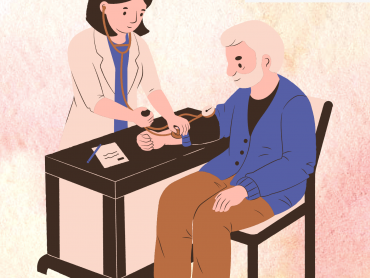Nurses work day and night, attending to various patients at the same time. Their job is both physically and mentally exhaustive that leaves them with little to no time for themselves. They have to present themselves in the best light to support, encourage and motivate patients, even if they are under immense pressure.
Nurses are selfless as they always put the patients before themselves. But, in the process, they rarely think of their health and fitness. To maintain their sanity and fitness while taking care of everyone else, they can follow these simple health and lifestyle tips.
Health and Fitness Tips for Nurses
Consume a healthy diet
Food is the fuel for the body. By not eating enough nutritious food, the body will be out of energy. Considering the number of hours nurses have to be on their feet, they cannot afford fatigue and tiredness. Fatigue will increase the cravings, and they may end up snacking on unhealthy foods that would lead to various complications in the long run.
Foods to eat
The meals can consist of the following nutrients as they induce satiety and keep the insulin levels stable.
- Protein: Dals, eggs, chicken, fish, whole milk and milk products, nuts
- Fibre: Fruits, vegetables, whole grains
- Complex carbohydrates: Whole grains like wheat, rice, brown rice, quinoa, buckwheat, bajra, jowar, all millets, vegetables, fruits
- Healthy fats: Fatty fish, ghee, coconut oil, cold-pressed oils, nuts, sunflower seeds, pumpkin seeds
Foods to avoid
Nurses should stay away from empty calorie foods as they provide no nutritional value. Eating them once in a while will not make a huge difference, but replacing healthy meals with these foods will affect their bodies and quality of work.
- Refined flour foods such as white bread, pasta, noodles, breakfast cereals
- Refined or white sugar foods such as pastries, cookies, cakes, ice cream
- Sugary drinks, fruit juices
- Processed and packaged foods
- Processed meat
- Fried or grilled foods
- Fast foods
Healthy snacks and beverages options
Nurses can carry their own homemade, healthy snacks to prevent opting for unhealthy ones. They can have these snacks and refreshing drinks in between breaks to keep themselves energised.
Healthy snacks: Fruits, nuts, roasted chana, roasted makhana, dry bhel with chopped vegetables and fresh chutneys, baked vegetable chips, and boiled sprouts.
Healthy beverages: Buttermilk, coconut water, coconut milk, lemon juice, shikanji, kokum juice.
Stay Hydrated
Water has umpteen benefits, from flushing out toxins to fighting stress and fatigue. Therefore, nurses should replenish their fluids from time to time. Ideally, for every 20 kgs of weight, 1 litre of water is necessary. So if someone’s weight is 60 kgs, they must drink at least 3 litres of water daily. Depending on the season, geographical area and health requirements, the amount of water intake may vary.
Exercise Regularly
Lack of exercise leads to muscle pains, weak muscles and stiff joints. It can affect their performance as a nurse. There is only one solution for this – regular exercise. Exercising not only strengthens muscles and improves bone density but also releases feel-good hormones. Furthermore, regular exercise improves stamina, prevents health complications and energises us instantly. 30-40 mins of daily exercise is recommended. Nurses can alternate between aerobic and strength training exercises. Apart from that, engaging in mobility exercises improves the motion of joints and releases stiffness.
Aerobic exercises
- Brisk walking
- Jogging
- Running
- Cycling
- Swimming
- Dancing
Strength training exercises
- Bodyweight exercises: Squats, Chair squats, Push-ups, Lunges, Calf raises, Crunches, Reverse crunches, Hip bridges, Planks, Surya namaskar
- Weight training
- Exercises using resistance bands
If dedicating a particular time for exercising is tough, nurses can also do simple stretches and joint rotations between their breaks or before mealtimes.
Focus on Your Mental Health Too!
Nurses often do not find much time for themselves. They spend most of their time in a gloomy hospital environment that can impact their mental health and emotional well-being. Hence, engaging in activities to destress should help them calm and relax their minds.
- Do a short 10-15 minutes guided meditation.
- Practise breathing techniques such as deep breathing, alternate nostril breathing, candle blowing, etc.
- Join a yoga class or learn simple yoga asanas online.
- Maintain a gratitude journal to recollect and record the positive memories.
- Engage in fun activities such as reading, painting, sketching, knitting, watching funny videos, cracking jokes, playing games etc.
Get Enough Sleep
An uninterrupted, sound sleep fixes all stresses and fatigue and rejuvenates the body. Busy nurses may find it difficult to fall asleep due to the work-stress. Therefore, adopting other lifestyle changes such as a healthy diet, exercise, and meditation can improve sleep quality. Having a sleep routine also helps – unwind, get into comfortable clothes, keep electronic devices aside and lie down to sleep. Getting at least 7-8 hours of sleep is crucial for optimal functioning.
Tips to Include Exercising into Your Daily Routine
Wondering how to fit all of these healthy habits into your demanding schedule? Here are a few handy tips that can be used!
- Prioritize your exercise days: It may be a good idea to work on your fitness and exercise routine on your days off!
- Have an exercise plan in place: Plan out your exercise routine and determine what exercises you love the most and the most energetic part of your day. Set achievable personal goals and continue working towards them.
- Fit in workouts in your daily routine: Sounds like a hectic day already, so how can you fit exercise into your daily grind?
All of the health and lifestyle factors are crucial and interrelated. Nurses must slowly incorporate these changes in their life to stay fit and prevent health complications. Sometimes, self-care is also important. If the nurses are healthy, then they can help their patients be healthy too.









